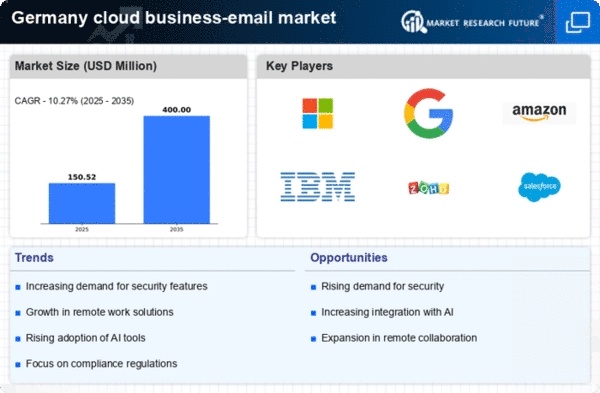Increased Focus on Cost Efficiency
Cost efficiency remains a pivotal driver in the cloud business-email market in Germany. Organizations are increasingly seeking solutions that offer a balance between functionality and affordability. The shift from traditional on-premises email systems to cloud-based solutions is often motivated by the potential for reduced operational costs. Businesses can save on hardware, maintenance, and IT staffing expenses by adopting cloud services. It is estimated that companies can reduce their email-related costs by up to 30% by transitioning to cloud-based platforms. This financial incentive is particularly appealing to small and medium-sized enterprises (SMEs) that may have limited budgets. As a result, the cloud business-email market is likely to expand as more organizations recognize the long-term cost benefits associated with cloud solutions.
Growing Demand for Remote Work Solutions
The cloud business-email market in Germany experiences a notable surge in demand for remote work solutions. As organizations increasingly adopt flexible work arrangements, the necessity for reliable and efficient communication tools becomes paramount. This shift is reflected in the market, with a projected growth rate of approximately 15% annually. Companies are seeking cloud-based email solutions that facilitate seamless collaboration among remote teams. Accessing emails and documents from any location significantly enhances productivity and operational efficiency. Furthermore, the integration of features such as video conferencing and instant messaging within email platforms is becoming a standard expectation. This trend indicates a significant transformation in workplace dynamics, driving the cloud business-email market towards innovative solutions that cater to the evolving needs of businesses in Germany.
Rising Importance of Collaboration Tools
The rising importance of collaboration tools significantly impacts the cloud business-email market in Germany. As businesses increasingly recognize the value of teamwork and communication, email platforms are evolving to incorporate collaborative features. Tools such as shared calendars, document editing, and task management are becoming integral components of cloud email services. This trend is indicative of a broader shift towards integrated communication solutions that enhance productivity. Research suggests that organizations utilizing collaborative email tools experience a 20% increase in team efficiency. Consequently, the demand for cloud business-email solutions that offer these collaborative functionalities is expected to grow. This evolution reflects the changing landscape of workplace communication, where collaboration is paramount.
Regulatory Compliance and Data Protection
In Germany, stringent regulations regarding data protection and privacy significantly influence the cloud business-email market. The implementation of the General Data Protection Regulation (GDPR) mandates that businesses ensure the security of personal data. Consequently, cloud email providers are compelled to enhance their security measures, which may include end-to-end encryption and robust authentication protocols. This focus on compliance not only protects sensitive information but also builds trust among users. As organizations prioritize adherence to these regulations, the demand for compliant cloud business-email solutions is expected to rise. It is estimated that around 70% of companies in Germany consider compliance a critical factor when selecting email service providers. This trend underscores the importance of regulatory frameworks in shaping the cloud business-email market landscape.
Technological Advancements in Email Services
Technological advancements play a crucial role in shaping the cloud business-email market in Germany. Innovations such as artificial intelligence (AI) and machine learning are increasingly integrated into email platforms, enhancing user experience and operational efficiency. Features like smart sorting, automated responses, and predictive text are becoming commonplace, allowing users to manage their communications more effectively. The market is projected to grow by 12% annually as businesses seek to leverage these technologies to streamline their email processes. Additionally, the rise of mobile email applications further supports this trend, enabling users to access their emails on-the-go. As technology continues to evolve, the cloud business-email market is likely to witness further enhancements that cater to the dynamic needs of businesses.
















